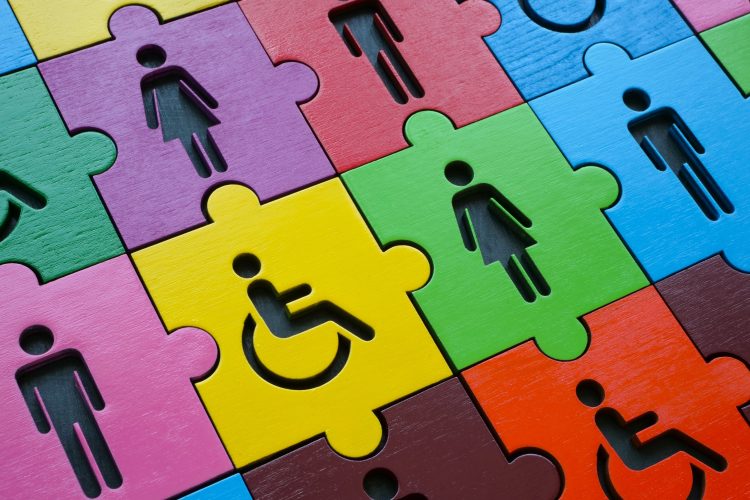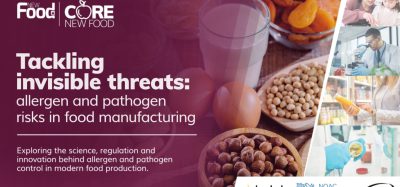From roundtable to reality: LGBTQIA+ inclusion in food safety
- Like
- Digg
- Del
- Tumblr
- VKontakte
- Buffer
- Love This
- Odnoklassniki
- Meneame
- Blogger
- Amazon
- Yahoo Mail
- Gmail
- AOL
- Newsvine
- HackerNews
- Evernote
- MySpace
- Mail.ru
- Viadeo
- Line
- Comments
- Yummly
- SMS
- Viber
- Telegram
- Subscribe
- Skype
- Facebook Messenger
- Kakao
- LiveJournal
- Yammer
- Edgar
- Fintel
- Mix
- Instapaper
- Copy Link
Posted: 23 January 2024 | Byron D. Chaves, Chris Jordan, Katerina Roth | No comments yet
Industry leaders explore challenges and strides in LGBTQIA+ representation in the food safety sector and address how to foster a working environment where employees feel safe expressing their identities.


By Byron D. Chaves Ph.D., Assistant Professor at the University of Nebraska-Lincoln; Chris Jordan, Director of Business Development and Technical Consulting at Diversey; and Katerina Roth, Ph.D. candidate at Cornell University.
A roundtable about supporting LGBTQIA+ individuals in food safety was held for the first time at the International Association for Food Protection Annual Meeting in 2023. Members of that roundtable, including Byron D. Chaves (BDC) Ph.D., Assistant Professor at the University of Nebraska-Lincoln; Chris Jordan (CJ), Director of Business Development and Technical Consulting at Diversey; and Katerina Roth (KR), Doctoral Candidate at Cornell University, gathered following the roundtable to talk about their perceived status of the LGBTQIA+ community in food safety…
Where are we with diversity in the food safety industry and how far do we need to go?
Byron D. Chaves (BDC) Ph.D., Assistant Professor at the University of Nebraska-Lincoln: We have a large diversity in worker composition in the industry but not necessarily in management and supervisory roles in or any other space where decision-making happens. What is missing are pathways for these individuals to work their way into leadership in a thoughtful and appropriate way and contribute with programs where they would find ways to represented in those leadership roles.
Chris Jordan (CJ) Director of Business Development and Technical Consulting at Diversey: Food safety, as an industry, has a very wide range of work environments: agriculture, manufacturing plants, supply chain, foodservice, grocery, academia, regulatory, and a variety of service providers. Each industry segment might be in a slightly, or drastically, different place, relative to LGBTQIA+ diversity. While we have a long way to go for all in our community to be seen and respected across the board, we have made some big strides, as well. Many companies are deploying DE&I strategies to help employees and colleagues be comfortable with themselves at work – enough to be our own advocates for ourselves and others. We have to remember that advocacy from within our own community is key to moving attitudes within our industry.
How do current and proposed laws impact the LGBTQIA community and how do they impact our industries and workplaces?
Katerina Roth, Ph.D. candidate at Cornell University (KR): More than 20 states have passed or proposed legislation that limits life-saving healthcare for transgender individuals or restricts access to facilities or resources. In June of 2023, the United States Supreme Court ruled that a business can refuse certain services if they morally object to the customer’s identity. These laws and policies create a hostile environment that fuels prejudice and misunderstanding and place an unfair burden on those already facing significant and increasing societal challenges.
CJ: Laws affect attitudes, behaviors, and stress levels, which effects productivity and overall workplace environments. I would challenge any straight person to tell me how it feels to have your sexuality debated and regulated in the public sphere. Tell me the stress level of whether or not they, as people, are discussed as “intrinsically disordered” or compared to “bestiality” in the media, in churches, or on the floors of legislative bodies. If you’ve ever thought about that perspective and the stress it causes to an individual – whether it’s recognised outwardly or held internally – it’s a massive weight and burden to carry.
At this point in our society, corporate workplace efforts are making up for the lack of legislative actions protecting the full rights of the LGBTQIA community, and we would encourage this even more broadly – no matter how small of a company it is.
BDC: The political climate is such that our students may not feel safe in many states regardless of the great work that is getting done in those places. State laws and regulations are certainly a factor that minoritised students consider when applying to graduate school, for example, and may prevent highly qualified candidates from moving to areas of the country where they don’t feel safe expressing their identities.
Why is diversity within this industry especially important?
BDC: Because the food industry is a globalised industry, working with individuals and companies all over the world. Everybody eats and we need to deal with people in different stages of life and the places where they live and work.
KR: The food industry relies heavily on a diverse workforce that encompasses people from all walks of life, regardless of their gender identity or sexual orientation. Embracing and supporting this diversity not only cultivates a more inclusive environment, but it also enhances creativity, innovation, and productivity within the industry.
Industry wake-up call: Prioritising equality, diversity, and inclusion
CJ: Talent. This industry is entrusted to protect our food supply. We need the best talent to do this, and why exclude someone from the pool of candidates because of a poor culture or attitudes towards them – or someone they know. If you were a contract lab or a food manufacturer in need of a microbiologist, would you want someone to not come work for you because of your existing culture? Not having an open, inclusive work culture will be a deterrent – especially with the new generation of our workforce. Companies need to recognise that authentic, inclusive DE&I programs are prerequisites for much of the younger generation. It’s a competitive advantage. Don’t expect the new generation to accept “well, we’ve always done it this way.” That mindset and culture simply isn’t going to keep you competitive moving forward.
What is a safe space and how is one created? How can we make all labs, manufacturers, academic settings and stores safe places for everyone?
CJ: A safe space is an environment where individuals feel comfortable being their true selves. Or, it could be a sub-space, where you have a trusted resource/mentor/friend who you can speak with openly and freely. DE&I initiatives have played a big role in creating safe spaces for organisations. Generally, people within the community tend to find each other, but there are ways for allies to signal that they are “safe.” A key organisation tool is the use of pronouns within email signatures. It’s critical to not mandate this practice, so that those safe spaces are authentic and not forced on someone who may not be comfortable with various conversations.
A food service or grocery operation should be as diverse as their customer base. Everyone is in sales within the industry – selling a service or a product. To be competitive, you need the best teams you can build. If your work environment is hostile in any way, that will come around to reduce productivity, add unneeded stress, and really detract from the mission of any company. A happy workforce is a productive one. Creating safe places where individuals do not have to worry about security, harassment, or discrimination will be only of benefit to an organisation.
BDC: A safe space is created when you are able to develop trust with your leadership, even though they may not have the same identities as I do. I want to be able to have the trust that they are doing the right thing for myself and others despite being different in who they are. We need to feel confident that leadership will champion our safety and uphold policies that are in place for everyone. We can do so by turning policy into action. We often see policies in place but not necessarily being enacted or responded to on a daily basis. In academic environments it’s important to not only take the training but that there is some longitudinal analysis of whether people feel safe in those environments and then take action on that feedback. Finally, we need to stop rewarding people for contributing to a toxic environment where policies are not followed.
How do we build and maintain a diverse competitive workforce that benefits the organisation? What is the best way to attract LGBTQIA+ individuals to work for/with you?
KR: I think it’s important to being transparent with social media and hiring posts that the organisation is welcoming to LGBTQIA individuals. Companies need to make the effort to hire DEI experts and have DEI training so that everyone on the team is on the same page and it’s not superficial. For example, using correct terminology and pronouns on a daily basis in the workplace is a good start. Supporting existing LGBTQIA employees and making sure they feel safe and included is also so important because they are the ones that can vouch for the culture of a company.
CJ: I’d highly encourage the use of a DE&I council and resource groups. Publicise these programs on social media and on websites. It’s a big signal to new vendors, customers, and talent. Ensure there is communication from the CEO down and from middle management out regarding DE&I. It has to be a practice, not just a recruiter’s tool. Just think if someone sent in a resume for a position, was able to show a level of competence on paper and interviewed well, but then once hired the person couldn’t perform job tasks. They likely won’t be in that position very long. That’s a good analogy to a DE&I program on paper only, but not in practice. New talent will quickly figure out if it’s an integrated, authentic culture or not, and that may depend on how long that person stays at the company. Do you want them long term or short term?
Attracting and retaining diverse talent is fueled by building a culture to be proud of, and then putting that culture to work through industry affiliations, trade event participation, social media, and other websites. Build something great and then use that to your advantage.
BDC: I am a strong advocate for a multi-cultural environment in all ways – geographical, religious, cultural and other identities. Working on belonging in an organisation supports a workforce that is diverse and will continue to contribute. Companies should be vocal and transparent with core values, their stance on DEI and have a written policy available on websites and literature. They can ask directly if individuals are comfortable joining the organisation under these policies and be ready to have honest discussions around them.
About the authors
Byron D. Chaves is an assistant professor and food safety extension specialist at the University of Nebraska-Lincoln where he conducts research, teaching, and extension in applied food safety microbiology, sanitation, and food safety management systems. Byron has a BS from the University of Costa Rica, an MS from Clemson University, and a PhD from Texas Tech University, where he was also a postdoctoral associate for two years before joining the faculty at UNL. He is the recipient of the 2022 “Holling Family Inclusive Excellence in Teaching and Learning Award”, recognizing the embodiment of diversity and inclusive excellence in teaching, and the 2023 “Dinsdale Family Faculty Award”, recognizing outstanding teaching, research, and outreach in the UNL’s Institute of Agriculture and Natural Resources.
Chris Jordan is Director of Business Development, Food Safety & Technical Consulting Diversey, Inc. For over 22 years, Chris Jordan has worked in food safety & kitchen hygiene within the retail sector at Diversey, Inc. Chris has led key account sanitation programs, business development, food safety auditing, and food safety training programs. He works to strengthen customers’ cleaning & food safety programs by focusing on actionable, science and data driven results. Chris led the development of several key customer data and reporting plans within Diversey’s customer base, and he continues to work on innovation paths to continuously improve food safety systems. Chris is currently the Director of Business Development and the Food Safety & Technical Consulting Team for Diversey’s North American Retail, Foodservice, and Hospitality sector.
Katerina Roth is a fourth-year PhD candidate in the Food Science Department at Cornell University. She studies the genomics and spoilage capability of extremophilic bacteria to better understand their ecological roles, reduce food waste, and characterize an industrially-relevant genus. Katerina is the Chair of her department’s Community Outreach Committee, where she works to bring understandable, hands-on science education to communities in Upstate NY. Additionally, she stays involved in Cornell’s LGBTQ+ graduate community as a board member for Qgrads. In her free time, Katerina horseback rides, forages for mushrooms, bakes, and explores local trails with her two dogs.









